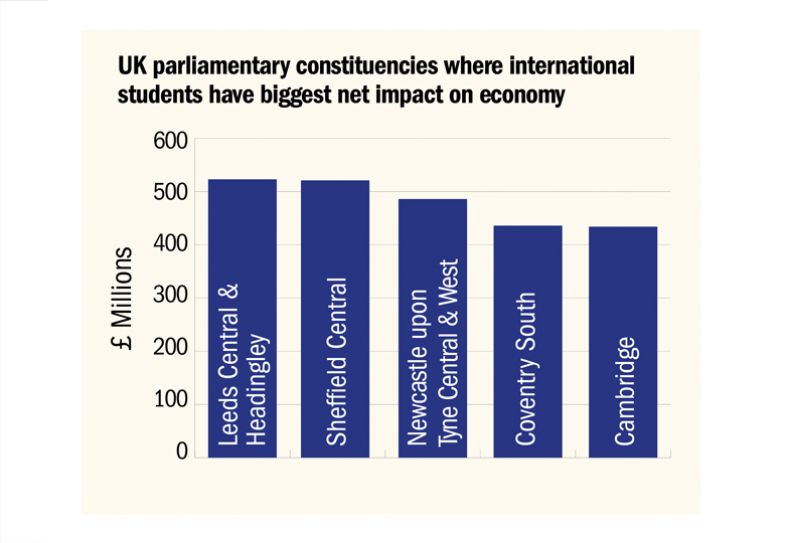Cohorts of international students are now worth as much as £500 million to the local economy of individual UK parliamentary constituencies, figures suggest.
Analysis conducted by London Economics for the Higher Education Policy Institute (Hepi) and Kaplan last year found that each cohort of overseas learners is worth an estimated £41.9 billion to the UK as a whole over the duration of their studies.
That research has now been updated to more accurately reflect the constituencies where foreign students actually live, revealing a greater concentration in major urban areas.
It shows that the 5,585 first-year international students in the Leeds Central and Headingley constituency bring £578 million in economic benefits. Once their costs to public services are taken into account, this results in a net impact of £523 million.

This was followed by £576 million in Sheffield Central (£521 million net), and £536 million in Newcastle upon Tyne Central and West (£486 million net).
All 650 of the UK’s constituencies have been mapped ahead of the general election, with even the smallest beneficiary, North Norfolk, seeing a net gain of £2 million.
Nick Hillman, Hepi’s director, said he hoped to distribute the data to candidates in every single constituency, following the publication of polling by the National Centre for Social Research that showed 71 per cent of voters now support limits on student migration. Forty-one per cent think it should be reduced from current levels.
“The public have changed their minds on international students, and a majority do now want a cap,” said Mr Hillman.
Campus resource: Four key hurdles international students face – and what to do about them
“That’s a worrying finding for our sector but also means numbers like this are especially important because they remind people of the economic value.”
The number of international students granted visas dropped 22 per cent year-on-year during the first three months of 2024, after most learners were banned from bringing family members with them to the UK.
Although not all the economic benefits of international students will necessarily be spent in the area they live in, Hepi said the new figures show their value to every part of the UK – particularly areas that do not have a university in them but still benefit.
Register to continue
Why register?
- Registration is free and only takes a moment
- Once registered, you can read 3 articles a month
- Sign up for our newsletter
Subscribe
Or subscribe for unlimited access to:
- Unlimited access to news, views, insights & reviews
- Digital editions
- Digital access to THE’s university and college rankings analysis
Already registered or a current subscriber?








